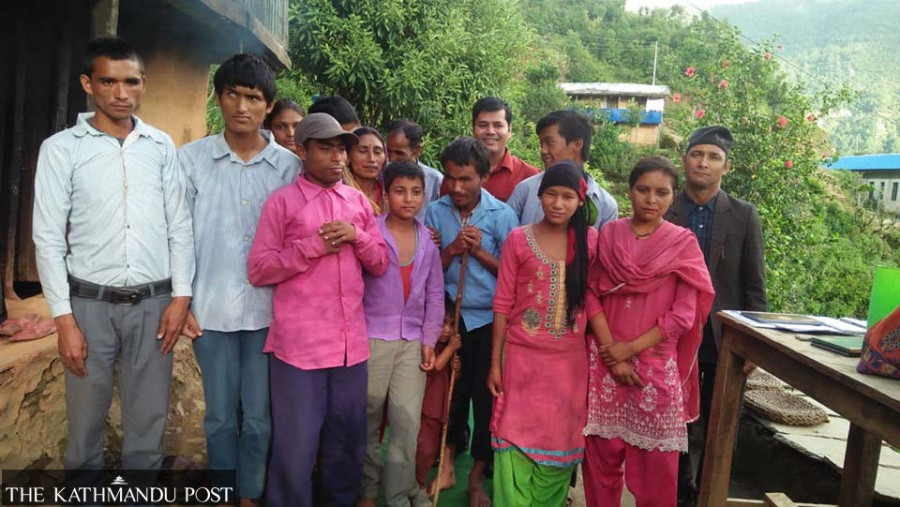Karnali Province
Children with disabilities out of school in Karnali
For a lack of special classes, trained teachers and supporting physical infrastructure, disabled children in Province are deprived of basic education.
Jyotee Katuwal
Dan Bahadur KC from Musikot Municipality-3 has been trying to admit his son, Kamal KC, to a school for the past 16 years but he has yet to find a school that would accommodate his son’s special needs.
Kamal KC was born deaf and has different educational needs than his peers.
“I take my son to Surkhet every year to seek admission in schools,” said Dan Bahadur. “But there aren’t many schools equipped to meet his special needs. The schools for children with special needs have a limited quota and my son has yet to make the cut.”
Nineteen-year-old Padam Nepal from Chaurjahari in Rukum (West) is blind. He was enrolled in the local community school when he was 15 years old but left two years later.
“I went to the school but I could not pass grade 1. I could not compete with the rest of the class since I did not understand what was being taught in class,” said Nepal. “If the school had conducted separate classes for me, then maybe I would have been able to study and pass my exams. The local unit has not done anything for children with special needs so most of us remain uneducated.”
Because of a lack of special classes, trained teachers and supporting physical infrastructure, the majority of disabled children in Karnali Province are deprived of basic education.
The local units in various districts of the province have established resource classrooms following the direction of the Social Development Ministry to facilitate education for children with disabilities. But these classrooms have several shortcomings. Not all local units have set up resource classrooms, keeping a majority of children with disabilities out of the school system. The resource classrooms that are in operation are also not disabled-friendly, according to Bishnu Prasad Bhattarai, the coordinator of Lekhajokha Kendra, a government-funded organisation, in Surkhet.
Out of 79 local units in the province, only 49 have designated resource classrooms for children with disabilities.
“Only 33 such classes are in operation in Karnali,” said Bishnu Sharma, chairman of the National Federation of the Disabled in the province. “Most disabled persons are illiterate, as they never get the chance to be a part of the education system in Nepal.”
As per the standard operating procedure for resource classrooms, only 10 students are to be taught per classroom but most resource classrooms in the province have not been following the standard, with twice the number of children being taught in one classroom.
Currently, 651 children with disabilities are studying in 33 institutions, far exceeding the standard procedure, according to Bishnu Adhikari, the education unit chief at the Social Development Ministry.
According to Raju Basnet, general secretary of the National Federation of the Disabled, around three percent of the total population in Karnali are living with various disabilities.
“There are 51,000 disabled people in Karnali, out of which 20,400 are children,” Basnet said.
The federation said that around 97 percent of disabled children in the province are out of the education system.
The indifference of all three levels of government to create a conducive environment for children with special needs to get an education has further compounded the plight of the disabled population.
“All levels of government should make a joint effort to provide basic education to disabled children, even bringing provisions wherein education for the disabled becomes mandatory,” said Basnet.
According to Bhattarai of Lekhajokha Kendra, most of the disabled children out of the education system are those with hearing impairment and intellectual disability.
“One of the reasons why disabled children are out of the school system is a lack of proper data with the local government. There is no actual data on the number of children born with disabilities and those living with disabilities. This vacuum in information has kept many disabled children out of schools,” said Bhattarai. “The authorities should work towards creating and maintaining a proper database of persons with disabilities so that not a single one of them is left out of plans and policies tailored for their needs.”
Adhikari of the Social Development Ministry says that education for disabled children has been included in the education policy prepared by the ministry but it is up to the local units to ensure that every child gets an education.
“It’s in the constitution. The local government needs to be serious about the issue. The ministry has underscored the need for infrastructure development for resource classrooms,” he said.
Social organisations, such as Save the Children, are actively involved in providing education to children with disabilities in the province, says Dhana Bhusal, the associate director of Save the Children.
“We have been running a ‘home schooling’ programme for children with disabilities. The programme is aimed at assisting disabled children to continue their learning. We also provide training to teachers; collect data of the disabled children; and formulate an education plan,” said Bhusal.




 25.96°C Kathmandu
25.96°C Kathmandu















